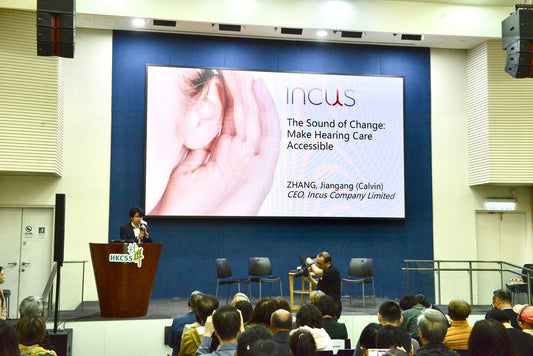
Those of us who have experienced a parent or grandparent losing their hearing might wonder: Is hearing loss hereditary? We may be concerned that hearing loss runs in the family and whether we will pass it on to our children. In this article, we explain genetic hearing loss.
Can Hearing Loss Be Hereditary?
Yes, hearing loss can be hereditary.
Hereditary hearing loss means hearing loss that is fully or partially caused by genetic mutations passed on from the parents to the child. It is usually already present at birth. Sometimes, the hearing loss develops after birth, for example when the body responds to medicines in a certain way because of genetic mutations.
Treating hearing loss is beneficial to the development of a child.
How Common Is Hereditary Hearing Loss?
We sometimes hear of children being born with hearing loss, or developing it before they learn to speak. This is called prelingual hearing loss and affects around 0.2% of children. Babies who have spent time in intensive care could be up to 10 times more likely to have a hearing loss.
That said, the majority of hearing loss comes from environmental factors. For example, most of us will eventually develop age-related hearing loss from continued exposure to noise throughout our lives. So, if a parent or grandparent develops a hearing loss, it is unlikely (but not impossible) that it was caused by genetics.
Congenital Hearing Loss
If the hearing loss is already present at the time of birth, it is called congenital hearing loss. The opposite is called acquired hearing loss. Not all congenital hearing loss is genetic.
Congenital Hearing Loss Causes
There are two main types of causes of congenital hearing loss:
- Genetic
- Non-genetic
Genetic causes of hearing loss refer to certain mutations in the genes the child inherited from the parents. Researchers have found thousands of different genetic mutations across at least 234 genes that could cause hearing loss.
Non-genetic causes of hearing loss include infections like congenital cytomegalovirus (cCMV) or maternal infections during pregnancy.
Syndromic versus Nonsyndromic Hearing Loss
Genetic causes of hearing loss can be categorized as either syndromic or nonsyndromic.
Syndromic means there are malformations of the external ear or other organs or some other medical problem. For example, babies with Waardenburg syndrome, Usher syndrome or Down syndrome often have hearing loss.
Nonsyndromic means there are no other apparent health issues caused by the genetic mutation apart from hearing loss. 80% of genetic hearing loss are nonsyndromic.
Genetic sequencing can be done to check for the mutations that are known to most commonly cause hearing loss. With this genetic hearing loss test, healthcare professionals can pinpoint the exact mutation that was the cause. Often, however, the specific genetic mutation will remain unknown.
How Do We Know If Hearing Loss Will Be Passed Down?
There are different scenarios where hearing loss is passed down from parents to their child. It all comes down to whether the parents carry genetic mutations that could cause hearing loss.
A genetic mutation can be either dominant or recessive.
If the mutation is dominant, it is enough for just one of the parents to pass it on. Recessive mutations will only affect the child if they were inherited from both parents.
Around 80% of cases are caused by recessive genetic mutations where parents did not have any reason to expect that the child would be born hard-of-hearing. This could happen if they both carried the same recessive mutation. If they have a child, the probability that it will have genetic hearing loss is 25%.
Children of parents with hearing loss caused by dominant genetic mutations have a 50-100% probability of inheriting hearing loss.
Prospective parents could go through genetic testing to evaluate how likely they are to have a hearing-impaired or deaf baby.
Tip: It is also possible for genetic hearing loss to be sporadic: the child might have a genetic mutation that the parents did not have.
How Hearing Loss in Babies Is Detected

In most countries, newborns are screened for various health conditions shortly after birth. Hearing loss is one of them.
Special automated hearing test methods are used to screen babies since they are unable to follow instructions. Normally, healthcare workers will use an automated otoacoustic emissions test (AOAE) and/or an automated auditory brainstem response (AABR) to screen for hearing loss in among babies. Both tests are safe and do not cause pain for the baby.
Automated Otoacoustic Emissions (AOAE) Test
The purpose of the AOAE test is to confirm that the baby’s inner ears can detect sounds.
The AOAE test is done by inserting a soft ear tip into the baby’s ear. It produces sounds, and the device measures the echo generated by the ear. In a healthy ear, the inner ear would produce soft echos when they detect sounds.
Automated Auditory Brainstem Response (AABR) Test
In essence, the AABR test aims to confirm that the baby’s brain is able to receive sound signals and process them. Electrodes on the infant's head measure the response from the hearing nerves and the brain.
Other Screening Methods
Other screening methods also exist. For example, the Hong Kong Department of Health’s Maternal Child Health Centre used the Distraction Test instead in the past. After the completion of a successful pilot project, they now offer AOAE tests instead.
What Happens if the Baby Fails the Screening Test?
These tests are screening tests, so the results are not perfect. Some babies with healthy hearing fail the screening test. If a baby fails the screening test, it will be referred to an audiologist or specialist for further checking.
Signs of Hearing Loss in Babies
Parents should be observant and look for signs of hearing loss even if hearing loss was not detected during screening.
These are the top 16 signs of hearing loss you should look for in your baby:
- Does not react to unexpected loud noises by the time they are one month old
- Unable to recognize a parent’s voice by the time they are three months old
- Unable to turn their eyes or head in the direction a sound comes from by the time they are six months old
- Unable to say simple words by the time they are twelve months old
- Learn to talk later than other children
- Unaware of your presence until they see you
- Respond more to some types of sounds (for example vibrating or low-frequency sounds) compared to other sounds
- Does not appear to enjoy being told stories
- Prefers to listen to the tablet or TV at a loud volume
- Does not respond to their name being called
- Does not react to voices
- Stops experimenting with making sounds
- Tries to speak but is unable to move on to understandable speech
- Appears to hear well sometimes but not at all at other times
- Struggles to keep their head steady
- Learns to sit or walk unsupported later than expected
Conclusion
Hearing loss can be hereditary, and around 1 out of 500 children develop a hearing loss before they learn to speak. Whether or not a child will have genetic hearing loss comes down to the parents' genetics, and testing could reveal the risk. Healthy hearing is crucial for a child’s development, so hearing loss needs to be treated. Most countries have effective health screening programs that detect hearing loss in children, but parents should still be aware of the top signs of hearing loss in babies.



